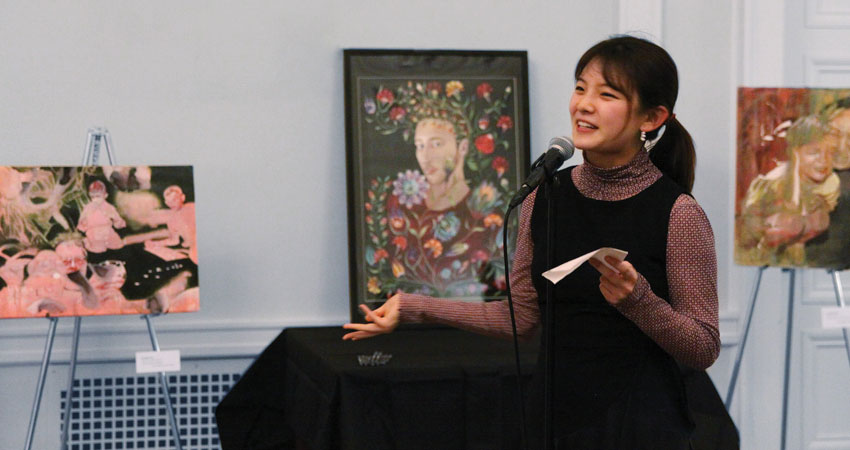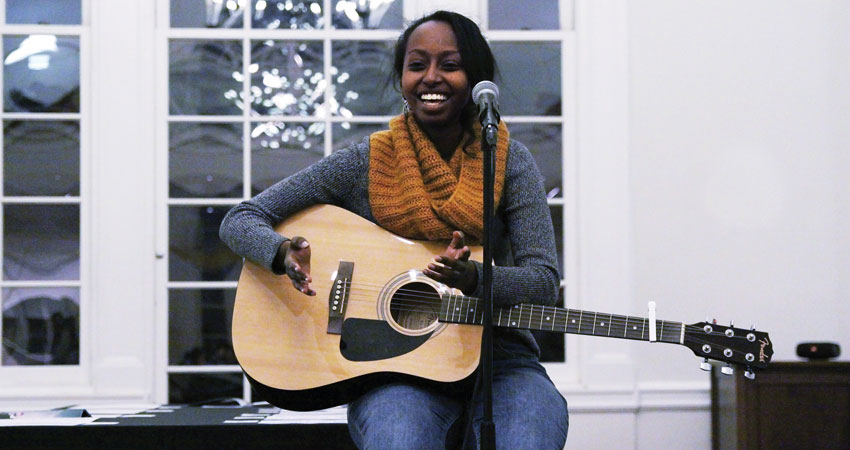Christian Union Events Examine Art and Philosophy
by tom campisi, managing editor
Christian Union at Brown helped organize two key events that made inroads and friendships in the arts and philosophy communities.
In February, Christian Union co-hosted an art exhibit entitled “How Do We Live a Good Life?” The event, held at the Leung Family Gallery at Brown, was co-sponsored by the Veritas Forum, Ethical Inquiry, the Office of the Chaplains and Religious Life, and Cornerstone Magazine.
Approximately 70 students and guests from Brown and nearby Rhode Island School of Design (RISD) attended the art exhibit, which included a reception and brief talks from each artist.
“The art exhibit was a fantastic outreach and was done with excellence,” said Justin Doyle.
“The students from Christian Union, The Branch (Chi Alpha), BCF (Brown Christian Fellowship, a ministry of IV), RUF, BCM (Black Christian Ministries), and BRCC (Brown and RISD Catholic Community) formed an inter-fellowship student leadership team and took the reins early on. They found space on campus, gathered artists/artwork, and planned the evening. It was incredible watching them passionately organizing this event with a heart for reaching fellow students at Brown and RISD who are far from God.”
Emily Ma ’21, a leader with Christian Union who helped plan the event, said one of the highlights was how students with a Christian worldview and those with no religious belief were open to share what influenced their artwork.
“The way in which the Christian artists shared their pieces with the audience demonstrated thoughtfully how God has shaped their lives and how their response to the ‘Good Life’ question cannot be separated from having a loving relationship with God and living a life obedient to His will,” she said. “There were powerful testimonies that sparked conversations and questions amongst the viewers.”
Ma also noted how the topic caused one artist to admit that she “grappled” with the question in a way she never had before and how the question also prompted reflection among others in attendance.
“The exhibit opened up a space where people can use creative tools to communicate what is important to them, which helped normalize the discussion about spirituality and truth,” said Ma, a psychology major. “It aptly showed that meaningful conversations like this can occur more often, and really anywhere.”
In March, Christian Union, Ethical Inquiry, the Philosophy Institute at Brown, the Office of the Chaplains and Religious Life, and various ministries co-hosted a Veritas Forum with the theme “Why You Should Love Absolutely Everyone: A Philosophical Defense of the Love Imperative.”
Approximately 150 students and staff from the Brown community attended the philosophy forum, which also included a Q and A session. The speakers were Dr. Meghan Sullivan, the Rev. John A. O’Brien Collegiate Chair and Professor of Philosophy at Notre Dame University, and Dr. Nomy Arpaly, Professor of Philosophy at Brown University.
Dr. Sullivan unpacked the Christian love imperative, defended it from some difficult objections, and indicated how it might serve as the basis for a mainstream philosophical approach to ethics. Sullivan argued that there is a “moral and rational obligation to love absolutely anyone… with dignity, indiscriminately, but in a way that’s appropriate to how their dignity is manifest,” according to the Brown Daily Herald.
Dr. Arpaly presented a response to Sullivan’s position, arguing that the idea of loving everyone “renders love meaningless.”
“If you love someone for their humanity, it’s humanity you love,” said Arpaly, according to the Brown Daily Herald.
“Dr. Sullivan did an amazing job presenting the Gospel in an academically rigorous manner,” said Doyle. “Later, 30 of us attended a dinner with her to continue the conversation. That gave us plenty of opportunities to engage with students and professors from the philosophy department, which, I’m sure, will prove to be invaluable in the semesters ahead.”
Like the art exhibit, the students involved with Christian Union and other ministries again displayed leadership in planning and publicizing. The ministry originally sought to host its own philosophy-centered event, but when the speaker fell through, Ma was encouraged by Doyle to reach out to philosophy professor Dr. Bernard Reginster and see if Christian Union could be part of the forum with Dr. Sullivan.
“Because of this academic partnership, we were able to reach a lot of philosophy undergraduate and graduate students and more faculty than in prior events, and therefore a more diverse demography,” Ma said. “The relationship we established with Ethical Inquiry opened up the opportunity to continue these partnerships in future forums and speaker events, to continue with the dialogue on what it means to live a ‘good life.’”
Judging by the outcome and feedback afterwards, Ma was certainly glad she made the connection.
“Meghan Sullivan’s talk was engaging,” said Ma. “It was impressive to see her tackle the topic of impartial love. It wasn’t until that evening that I was struck with how controversial and ‘irrational’ this concept is within the philosophical discipline. [Dr. Sullivan] provided persuasive arguments for how impartial love is plausible. This challenges secular belief and reminds Christians how ‘worldly’ love can be—but also [shows] how God makes the ultimate expression of impartial love. Frankly, it is impossible to love impartially without believing in a God who empowers and calls us to this way of life.”





